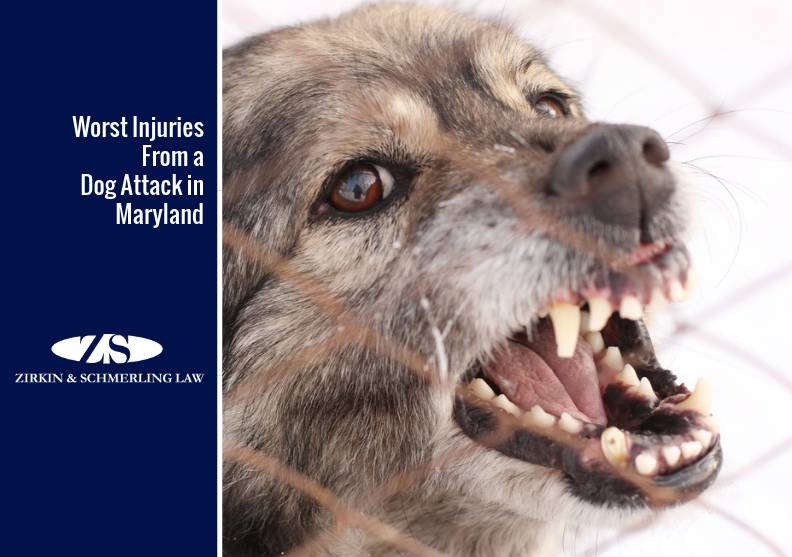
Imagine Fending Off A Dog Attack
You would do anything you could to block the bites. Hopefully, you would be able to fight off the dog successfully, but in the meantime, you’d likely suffer deep bite wounds trying to protect your face, neck and vital organs.
It’s no wonder the most common places on a person’s body for dog bite injuries are the hands, arms, feet and legs. These are the locations of so-called defensive wounds, where someone is trying to protect themselves from a dog attack and limit the damage. Health experts estimate 70 to 80% of all dog bite wounds are defensive wounds to the hands, arms and legs, with another 10 to 30% of wounds are to the head and neck. Of course, dog bite statistics alone don’t tell the whole story of the frightening attacks involved.
We remind you friendly dogs are the most common culprits of dog bite attacks in Maryland.
We’ve seen many stories in the news lately about people being bitten by dogs in Maryland. A pit bull attacked a child in Anne Arundel County. A dog in Baltimore County attacked a child and an adult at the same time. A Rottweiler attacked a construction worker in Prince George’s County and a police officer had to shoot the animal.
Although these stories can horrify, people are more likely to be injured by a friend’s dog, a family member’s dog or even their own dog than a strange dog encountered on the street. While we might not hear about all the attacks that involve a treasured family pet, these incidents happen all the time.
For instance, at Baltimore’s Shock Trauma Center, the worst injuries they see are to dog owners trying to stop their dogs from attacking.
“Cases have resulted in near amputation, disfigurement and even death,” says Raymond Pensy, MD, an orthopedic surgeon. “In one situation, a woman’s forearm bone was completely removed by the powerful grip of the dog bite, and both of her forearms and one of her hands became nearly useless.”
Severe Wounds More Common in Vulnerable Victims
For Maryland’s youngest and oldest citizens, life-threatening wounds are much more common than they are in everyone else. Someone who is very young or old may simply have a more difficult time fighting the strength of an attacking dog.
For people over age 50, there is a high risk of dying in the attack due to limited mobility. People over 50 account for 75% of all adult dog bite fatalities. Because the elderly are so vulnerable, use this advice to protect them from dog attacks.
- Make sure your own dogs are vaccinated.
- Walk your own dogs on a leash.
- Report loose or stray dogs and make sure your elderly neighbors know about them and have a way to get help if an attack were to happen.
If an older person has suffered injury from a dog attack, make sure to check on the healing of their wounds. Older adults, like children, have a higher risk of infection because of their age and the possible weakness of their immune system. Signs of infection include fever, chills, oozing from the wound and severe pain. In addition, older adults’ wounds can heal more slowly due to conditions like diabetes and heart disease. If a wound isn’t healing as fast as it should, older adults should return to a medical professional for further examination.
Protect Yourself From All the Wounds Dogs Inflict
We caution you not all injuries from dog attacks are bites. When you’re encountering a dog – familiar or unfamiliar – watch out for the other types of wounds a dog could inflict in addition to bites:
- Abrasions: Scraping and rubbing injuries cause broken skin, infections and scarring
- Crushing injuries: These occur when a dog’s weight crushes your body, bones and organs
- Lacerations: Deep cuts can be caused by a dog’s sharp nails as well as teeth
- Punctures: A puncture wound is a stabbing-style wound that penetrates deep into the skin
- Ripping injuries: Also called avulsions, these injuries rip the skin apart
- Nerve damage: A bite to a nerve can cause severe pain and permanent damage
- Infections: The bacteria in a dog’s saliva and fur can easily cause a serious infection
- Rabies: This is one of the worst and most life-threatening infections from a dog bite
- Tetanus: This is a secondary infection from the environment
- Scarring: The scars from dog bites can be deep, difficult to heal and some last forever
Have a Legal Question About Dog Attacks in Baltimore? We Have Answers.
If you have suffered injury from a dog bit in Baltimore, the attorneys at Zirkin and Schmerling Law are experts at answering all your questions and guiding you through the challenging process of Maryland dog bite law. We can help you hold the right person responsible for your injuries and file suit for damages. Contact us or call us at 410-753-4611 to set up an appointment with one of our dog bite attorneys today.
